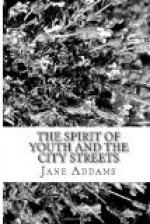And while many young people go to the theater if only to see represented, and to hear discussed, the themes which seem to them so tragically important, there is no doubt that what they hear there, flimsy and poor as it often is, easily becomes their actual moral guide. In moments of moral crisis they turn to the sayings of the hero who found himself in a similar plight. The sayings may not be profound, but at least they are applicable to conduct. In the last few years scores of plays have been put upon the stage whose titles might be easily translated into proper headings for sociological lectures or sermons, without including the plays of Ibsen, Shaw and Hauptmann, which deal so directly with moral issues that the moralists themselves wince under their teachings and declare them brutal. But it is this very brutality which the over-refined and complicated city dwellers often crave. Moral teaching has become so intricate, creeds so metaphysical, that in a state of absolute reaction they demand definite instruction for daily living. Their whole-hearted acceptance of the teaching corroborates the statement recently made by an English playwright that “The theater is literally making the minds of our urban populations to-day. It is a huge factory of sentiment, of character, of points of honor, of conceptions of conduct, of everything that finally determines the destiny of a nation. The theater is not only a place of amusement, it is a place of culture, a place where people learn how to think, act, and feel.” Seldom, however, do we associate the theater with our plans for civic righteousness, although it has become so important a factor in city life.
One Sunday evening last winter an investigation was made of four hundred and sixty six theaters in the city of Chicago, and it was discovered that in the majority of them the leading theme was revenge; the lover following his rival; the outraged husband seeking his wife’s paramour; or the wiping out by death of a blot on a hitherto unstained honor. It was estimated that one sixth of the entire population of the city had attended the theaters on that day. At that same moment the churches throughout the city were preaching the gospel of good will. Is not this a striking commentary upon the contradictory influences to which the city youth is constantly subjected?
This discrepancy between the church and the stage is at times apparently recognized by the five-cent theater itself, and a blundering attempt is made to suffuse the songs and moving pictures with piety. Nothing could more absurdly demonstrate this attempt than a song, illustrated by pictures, describing the adventures of a young man who follows a pretty girl through street after street in the hope of “snatching a kiss from her ruby lips.” The young man is overjoyed when a sudden wind storm drives the girl to shelter under an archway, and he is about to succeed in his attempt when the good Lord, “ever watchful




